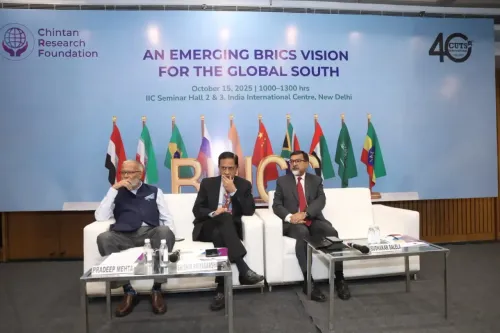Has the Rift Between the Pak Army and ISI Deepened After Intelligence Failures?

Synopsis
Key Takeaways
- ISI's intelligence failures have led to significant military setbacks.
- The Pakistani army is increasingly frustrated with the ISI's performance.
- Former allies like the Taliban have become adversaries.
- Internal discord within the ISI is affecting its operational effectiveness.
- Field Marshal Munir is attempting to restore order and improve strategies.
New Delhi, Oct 15 (NationPress) The Inter-Services Intelligence (ISI) of Pakistan, previously renowned as one of the most formidable espionage agencies globally, now appears to be faltering. The agency has failed to gather critical information across various fronts, resulting in deadly and humiliating assaults on security forces, particularly the Pakistan army.
Specifically, the army is frustrated with the ISI for its inability to provide timely intelligence regarding attacks from the Afghan Taliban, the Tehreek-e-Taliban, Pakistan (TTP), and also concerning Operation Sindoor. Reports indicate that the army chief, Field Marshal Asim Munir, is quite displeased with the intelligence agencies following a series of successful strikes by the Afghan Taliban on military positions in Pakistan.
According to Taliban claims, they have killed 58 Pakistani soldiers and injured many others. Indian officials assert that these series of damaging incidents have compelled the Pakistani establishment to rethink its strategy, leading to a significant reshuffle within the ISI.
Once viewed as assets by the ISI, the Taliban and TTP have now transformed into adversaries, and being outmaneuvered by groups that were once nurtured by the agency is seen as deeply embarrassing, as noted by officials.
Additionally, there are indications of division within the agency, resulting in poor coordination and inefficiency. Many ISI officials have remained in their positions for nearly three years, preferring to stay in their comfort zones, which has fostered a sense of lethargy and contributed to the agency's shortcomings.
Another instance of ISI's failure is the unrest instigated by Tehreek-e-Labbaik Pakistan (TLP). Historically, the ISI maintained a cordial relationship with the TLP, utilizing the group to exert pressure on the democratically elected government. The ISI maneuvered the TLP against leaders such as Nawaz Sharif and Imran Khan, both of whom ultimately lost their positions.
Currently, the TLP is vocally opposing the establishment, marking a significant setback for the ISI. On the Kashmir front, the agency also seems to be struggling, as Operation Sindoor caught the Pakistani establishment off-guard. Indian intelligence suspects that the failures in intelligence are primarily attributed to excessive military interference, lack of coordination, and internal discord.
With Field Marshal Munir now in charge, he has reportedly allowed the ISI to operate independently, taking control of decisions regarding its functioning and appointments. This has generated considerable discontent among officials, prompting Munir to convene a meeting at the General Headquarters (GHQ) in Rawalpindi, which included top representatives from both the army and ISI. The meeting aimed to assess the situation post the successful assaults by the Afghan Taliban on Pakistan's military installations.
During this high-level gathering, Munir expressed his dissatisfaction and cautioned officials against any further oversights, while seeking a comprehensive explanation for the repeated intelligence failures. He also chastised his officials for not devising a robust plan against the Afghan Taliban, indicating that the absence of a clear strategy has resulted in the recent humiliations.
Moreover, he instructed generals and officials to re-evaluate their strategies concerning the Taliban, which has continuously embarrassed Pakistan. The recent statement by Afghanistan's Foreign Minister, Amir Khan Muttaqi, affirming that Kashmir is an integral part of India, has not been well-received by the army chief, who has demanded immediate re-strategizing related to the Taliban.
Munir has issued an ultimatum to both ISI and army officials to rectify the system. Indian officials observe that while Munir has been promoting his newfound rapport with the US, the circumstances at home are nothing short of embarrassing.









